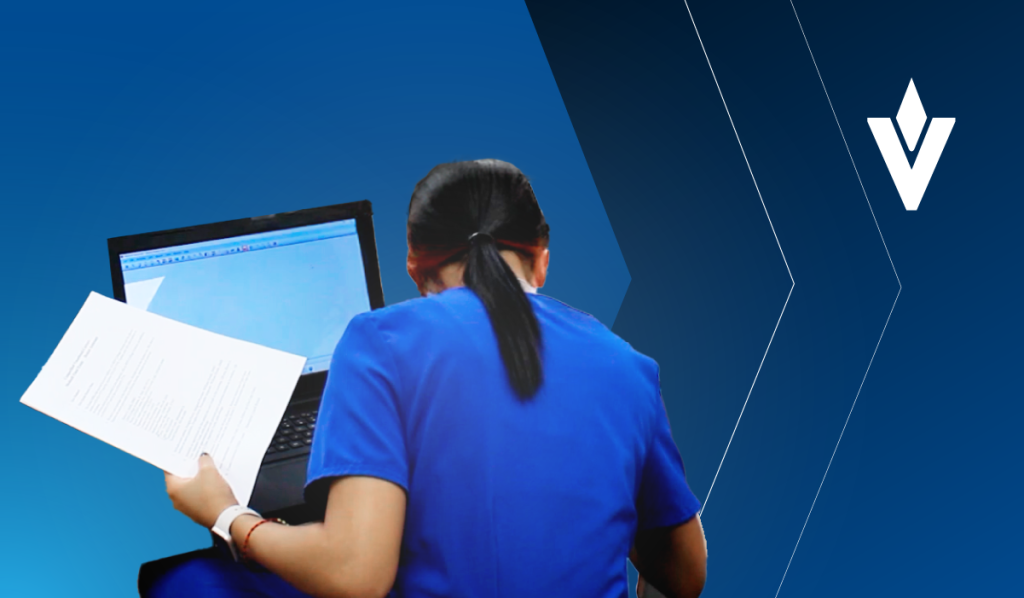Artificial Intelligence is no longer a futuristic concept—it has become an essential tool within the healthcare sector. From patient monitoring to supporting clinical decision-making, AI is transforming nursing in ways that enhance efficiency and improve patient outcomes. Nurses, who are the heart of healthcare, now have innovative tools that are not meant to replace their role, but to strengthen and expand their skills.

One of the most promising uses of AI in nursing is real-time monitoring. Wearable devices, smart sensors, and AI-powered platforms enable continuous tracking of vital signs, alerting healthcare staff to potential complications before they become critical. The use of these models helps process medical data that provides valuable insights to nurses and doctors, improving both patient outcomes and experiences across different areas of healthcare.
For example, an algorithm can detect subtle changes in heart rhythm or oxygen levels that might otherwise go unnoticed. In this way, technology acts as a “second set of eyes” that reinforces a nurse’s ability to respond effectively. This often requires making fast and complex decisions under pressure—and that’s where AI makes the difference by providing data-driven insights. AI does not replace the professional judgment of nurses; it strengthens it. Decisions remain in the hands of healthcare staff, but are now backed by more accurate and reliable data. A significant portion of a nurse’s day is often spent on administrative tasks, limiting the time available for direct patient care. AI is changing this reality by automating routine processes such as:
- Clinical documentation and record-keeping.
- Scheduling and workflow management.
- Medication reminders and error checking.
By reducing the administrative burden, nurses can focus more on delivering quality care.
In this way, AI becomes a true ally in healthcare, automating processes to improve both work quality and patient care by taking over repetitive, data-driven tasks. As technology continues to evolve, healthcare professions like nursing are also evolving, expanding their knowledge and integrating AI as a valuable and widely used tool.
Beyond monitoring and administration, AI is also revolutionizing nursing education and training. Simulation-based learning powered by AI allows nursing students and professionals to practice complex clinical scenarios in a safe, controlled environment. Virtual patients can mimic real-life conditions with a level of accuracy that textbooks cannot provide, offering immediate feedback and adaptive learning paths. This means nurses can refine critical skills, such as triage, patient communication, and emergency response, before applying them in real clinical settings. Moreover, AI-driven platforms help nurses stay updated with the latest medical research by filtering massive amounts of data and delivering concise, evidence-based guidelines directly to their practice. According to a 2023 report from the World Health Organization, integrating digital tools into healthcare training significantly improves skill retention and patient safety outcomes. As a result, AI is not only transforming patient care but also redefining how future nurses are educated, trained, and empowered to meet the evolving demands of modern healthcare.
This shift opens a wide range of opportunities for professional growth, leadership in innovation, interdisciplinary collaboration, and more strategic roles in healthcare. AI is not replacing nurses—it is empowering them within today’s technological world. By supporting decision-making and improving care quality, it is building a future where technology and humanity work hand in hand. However, while AI enhances healthcare delivery, it can never replace the empathy, compassion, and human connection that nurses provide. Listening, supporting, and advocating for a patient’s well-being are qualities that no technology can replicate.
CMVC
Your school of progress
References:
1. anderson, antonella. (2025, July 31). HIMSS 2025 Global Health Conference & Exhibition. HIMSS Global Health Conference & Exhibition. https://www.himssconference.com/the-impact-of-ai-on-nursing-will-automation-change-the-profession/
2. IBM. (2021, August 4). Inteligencia artificial en medicina. Ibm.com. https://www.ibm.com/mx-es/think/topics/artificial-intelligence-medicine
3. World. (2023, July 27). Digital tools positively impact health workers’ performance, new WHO study shows. Who.int; World Health Organization: WHO. https://www.who.int/europe/news/item/27-07-2023-digital-tools-positively-impact-health-workers–performance–new-who-study-shows